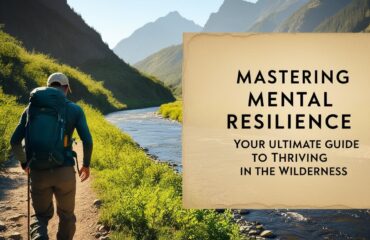
Discover effective coping strategies and the psychological benefits of navigating isolation in wilderness settings for personal growth and resilience.
Understanding the Impact of Isolation in Wilderness Exploration
Isolation is a common aspect of wilderness exploration, particularly for those who choose to embark on solo adventures. While solitude can provide a space for reflection and self-discovery, it can also pose significant mental health challenges. Those venturing into isolated environments may experience feelings of loneliness and anxiety, particularly if they are unprepared for the emotional and psychological demands of solitary exploration. Environmental factors, such as unpredictable weather and difficult terrain, can exacerbate these feelings, making it essential for individuals to develop effective coping strategies before setting out on their journeys.
Furthermore, societal attitudes toward solo adventurers, particularly women and minority hikers, can influence how individuals experience isolation in wilderness settings. For instance, female hikers often face skepticism or concern from others, which can heighten feelings of vulnerability when alone in the wilderness. Understanding these dynamics is crucial for anyone considering a solo trip, as they can impact an individual’s mental well-being and overall experience in nature.
Mental Health Challenges of Isolation
Isolation in wilderness settings can lead to significant mental health challenges, including feelings of loneliness and depression. Research indicates that the lack of social interaction during extended periods can adversely affect cognitive function, potentially leading to impaired decision-making and increased psychological distress. Individuals often report heightened stress levels when they are not mentally prepared for solitude, demonstrating the importance of self-awareness and readiness for such experiences.
The subjective nature of solitude complicates how we understand its effects. Different individuals may react to isolation in varying ways, influenced by their personality traits, previous experiences in nature, and the specific environmental conditions they encounter. For example, while some may find solace in the quiet of the wilderness, others may feel overwhelmed and anxious when faced with long stretches of solitude. This variability underscores the need for personalized approaches to managing the psychological impact of isolation.
Benefits of Solitude in Nature
Despite the challenges, spending time alone in the wilderness can yield significant psychological benefits. Research has shown that solitude in nature is often associated with reduced stress levels, improved cognitive function, and enhanced mood. Historical figures such as Moses and Buddha have long recognized the transformative power of wilderness solitude, utilizing it for deep personal reflection and growth.
Engaging with nature not only promotes emotional release but also fosters self-actualization. Studies suggest that individuals who immerse themselves in natural settings often emerge with new perspectives and increased creativity, highlighting the myriad cognitive benefits of solitude. Furthermore, the combination of nature and solitude can lead to unique psychological advantages, although the exact mechanisms behind these effects are still being explored.
Coping Strategies for Loneliness
To manage feelings of loneliness while hiking alone, individuals can employ various coping strategies. Regular communication with friends or family can provide emotional support and help mitigate feelings of isolation during solo trips. Engaging in mentally stimulating activities, such as journaling, reading, or solving puzzles, can also serve as effective distractions, enriching the wilderness experience and providing a sense of purpose.
In addition, bringing along entertainment like audiobooks or music can alleviate boredom and enhance the enjoyment of the journey. Mindfulness practices, including meditation and deep breathing exercises, can help individuals maintain emotional balance and focus amidst the solitude. For those who enjoy creative outlets, keeping a visual diary or creating art can serve as an expressive way to document experiences and emotions, further enriching the solo experience.
Preparing for a Solo Wilderness Experience
Preparation is vital for addressing the emotional challenges associated with long solo hikes. Mental readiness can significantly enhance the wilderness experience, allowing individuals to embrace solitude rather than feel overwhelmed by it. Structured programs, such as those offered by Outward Bound, focus on personal growth and emotional resilience rather than simply survival skills, providing a framework for individuals to navigate their solo experiences effectively.
Developing a comprehensive plan that includes daily goals and self-care routines can greatly enhance an individual’s confidence and enjoyment during their trip. Understanding the potential risks and preparing for emergencies can further reduce anxiety and improve overall mental well-being. By equipping themselves with the right mindset and tools, individuals can transform their solo wilderness trips into profound journeys of self-discovery and empowerment.
Distinguishing Healthy Solitude from Loneliness
It is essential to differentiate between healthy solitude and unhealthy loneliness in wilderness settings. Healthy solitude is characterized by a sense of empowerment and self-reflection, while unhealthy loneliness can lead to negative mental health outcomes, such as persistent feelings of despair or isolation. Engaging in self-compassion practices can help individuals navigate these feelings, fostering a healthier relationship with solitude.
The wilderness solo experience can serve as a modern adaptation of ancient initiation rituals, allowing individuals to reconnect with themselves and nature in a meaningful way. Recognizing the signs of unhealthy loneliness, such as intrusive negative thoughts, is crucial for maintaining mental wellness during solo adventures. By being mindful of their emotional state, individuals can better enjoy the benefits of solitude while minimizing the risks associated with prolonged isolation.
Embracing the Journey of Solo Wilderness Experiences
Coping with isolation in wilderness settings offers numerous psychological benefits that can lead to personal growth and resilience. While challenges exist, the rewards of solo wilderness experiences can be transformative, encouraging individuals to explore their inner selves and develop a deeper connection with nature. Maintaining a positive mindset and focusing on the present moment are essential for enhancing the overall experience of solitude in nature.
Ultimately, facing isolation can foster greater self-discovery and resilience, allowing individuals to emerge from their wilderness experiences with newfound perspectives and confidence. Sharing experiences and coping strategies can create a sense of community and support among solo adventurers, enriching the journey for all involved. Embracing solitude in the wilderness can thus become a path toward personal empowerment and emotional well-being.




